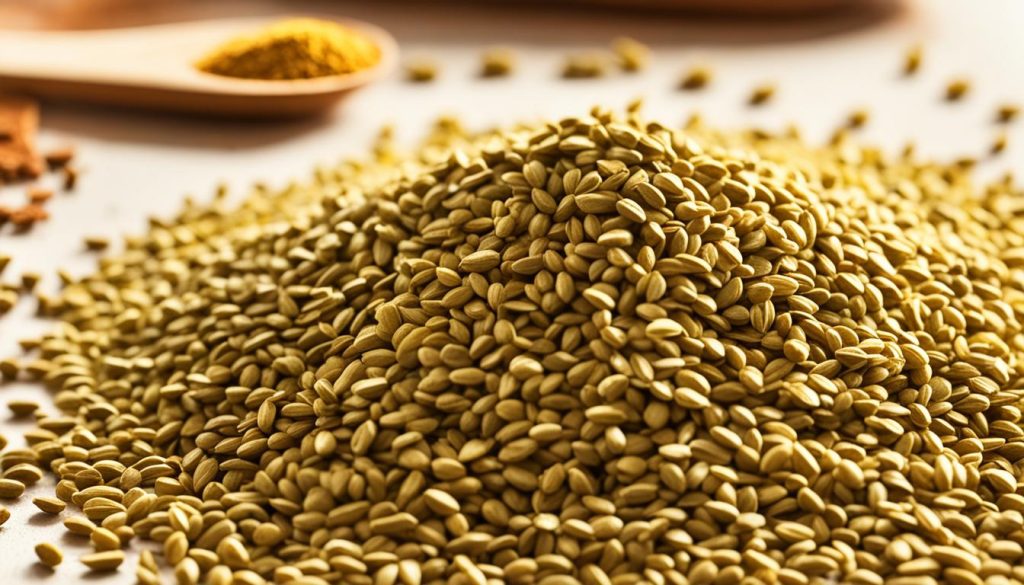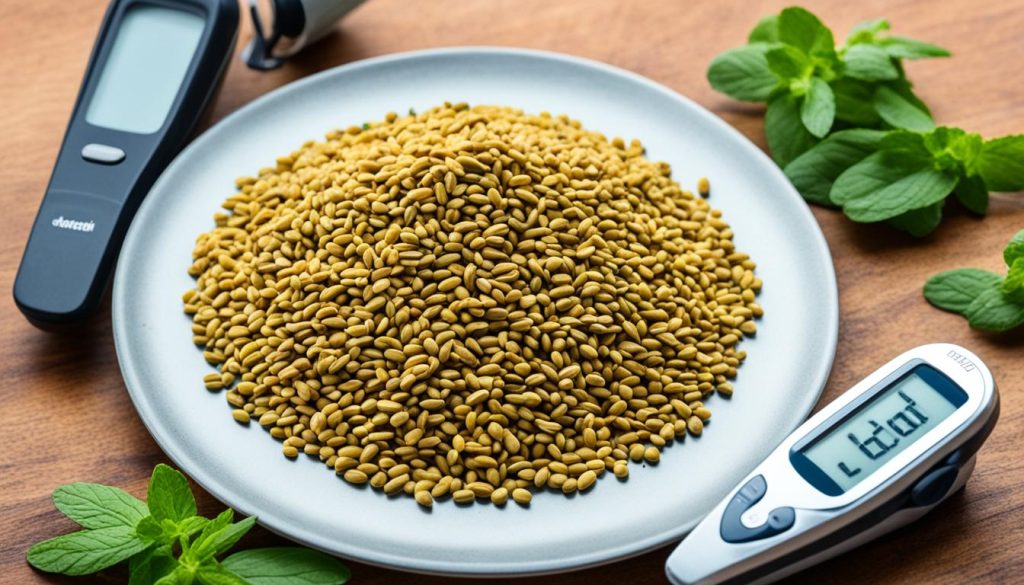I love cooking at home and always look for new ingredients. Fenugreek is one I’ve discovered that’s amazing. It makes my dishes taste unique, with a sweet and nutty flavor. Plus, it’s good for your health in many ways.
This article will show you why fenugreek is so great. We’ll talk about where it comes from, its health benefits, and how to use it. If you want to make your cooking better or find natural health remedies, fenugreek is worth trying.
What is Fenugreek?
Fenugreek is a plant with a long history and many uses. It grows 2-3 feet tall and has green leaves, small white flowers, and golden seeds. This plant is more than pretty; it’s been used in medicine for thousands of years.
Describing the Fenugreek Plant
The fenugreek plant belongs to the legume family, like soybeans and peas. Its leaves look like small clover leaves. Inside its pods are many small, aromatic seeds. These seeds are the main part used, known for their sweet, nutty taste.
Historical and Cultural Uses of Fenugreek
- Fenugreek has been used in medicine for a long time. It helps with many health issues.
- It’s also a common spice and thickener in Indian cooking. People love it for its unique flavor and health benefits.
- Even in personal care, fenugreek is used in soap and shampoo for its many properties.
The fenugreek plant is a versatile herb with a long history. It’s used in food and medicine, making it interesting and valuable today.
Fenugreek Nutritional Facts
Fenugreek is a versatile herb with a rich history. It’s not just tasty in many dishes but also packed with nutrients. One tablespoon (11 grams) of whole fenugreek seeds has 35 calories and lots of essential nutrients.
The fenugreek nutrition facts show it’s a great source of dietary fiber, with 3 grams per serving. It also has 3 grams of protein and 6 grams of carbohydrates. This makes it a balanced choice for many recipes.
Looking at the nutrients in fenugreek, these seeds stand out for their iron content. They provide 21% of the Daily Value (DV) in just one tablespoon. Fenugreek seeds also offer 6% of the DV for manganese and 5% of the DV for magnesium. These minerals are key for the body’s health.
| Nutrient | Amount per Tablespoon (11g) | % Daily Value |
|---|---|---|
| Calories | 35 | – |
| Total Carbohydrates | 6g | – |
| Dietary Fiber | 3g | – |
| Protein | 3g | – |
| Total Fat | 1g | – |
| Iron | 3.8mg | 21% |
| Manganese | 0.1mg | 6% |
| Magnesium | 17mg | 5% |
Fenugreek has been valued for its health benefits throughout history. Adding this versatile herb to your meals is a tasty way to get its nutrients.

Fenugreek for Boosting Breastmilk Production
Breastfeeding moms who have trouble making enough milk might find help in fenugreek. This herb is safe and can help increase breast milk. Studies show it’s good for nursing moms.
Research Studies on Fenugreek and Breastmilk Supply
An old study looked at fenugreek tea for 14 days. It helped 78 new moms make more breast milk. Their babies also grew more, showing the milk was good for them.
A 2011 study focused on how fenugreek affects breastmilk volume. They split 66 moms into three groups. One got fenugreek tea, one got a fake tea, and the third got nothing. Moms drinking fenugreek tea made more breastmilk, from 1.15 ounces to 2.47 ounces.
These studies show that fenugreek can increase breast milk production. It’s a natural way to boost breastmilk supply for nursing moms. The fenugreek for breastfeeding results are good news for moms wanting to make more breastmilk.

“Fenugreek can be a safe, natural alternative to prescription drugs for boosting breastmilk production.”
Enhancing Testosterone Levels with Fenugreek
Want to boost your testosterone and improve your sexual function? Fenugreek, a herb with a long history, might be what you need. Studies show it could be a strong help for better male health.
A study showed that 300 mg of fenugreek twice a day for 8 weeks, with weight training, raised testosterone in men. It also cut down body fat without losing muscle strength. Another study with 30 men taking 600 mg of fenugreek extract, plus magnesium, zinc, and vitamin B6, found more strength and better sexual function.
Fenugreek boosts testosterone thanks to its special compounds. These include saponins and 4-hydroxyisoleucine, which help control testosterone levels naturally. Using fenugreek could give men more energy and better sexual health.
“Fenugreek has been used for centuries in traditional medicine for its purported ability to enhance male sexual function and hormone balance.”
If you want to try fenugreek, talk to a health expert first. They can help with the right amount and safety. With the right advice, this old herb could be your key to being your best.

| Study | Findings |
|---|---|
| 8-week study with 300 mg fenugreek twice daily | Significant increase in testosterone levels, reduction in body fat, no decrease in muscle strength |
| 6-week study with 600 mg fenugreek extract, magnesium, zinc, and vitamin B6 | Increased strength and improved sexual function in participants |
Fenugreek for Blood Sugar Control
Fenugreek is known for helping manage blood sugar and treat type 2 diabetes. Many studies have looked into how this herb affects blood sugar. They offer insights for those wanting natural ways to manage diabetes.
Studies on Fenugreek and Diabetes Management
A study showed that people with type 2 diabetes saw lower fasting blood sugar levels when taking 5 grams of fenugreek seed powder twice a day for 2 months. They also lost belly fat, reduced BMI, and lowered hemoglobin A1c levels. Fenugreek’s high fiber is key to helping control blood sugar, even for those without diabetes.
Another study found that adding fenugreek powder to buns and flatbreads lowered blood sugar after meals in people without diabetes. This shows fenugreek can help manage blood sugar after eating for many people.
| Study | Findings |
|---|---|
| Study 1 | Fenugreek seed powder (5g twice daily for 2 months) reduced fasting blood sugar, belly fat, BMI, and hemoglobin A1c in people with type 2 diabetes. |
| Study 2 | Replacing 10% of refined wheat flour with fenugreek powder in baked goods significantly lowered post-meal blood sugar levels in people without diabetes. |
The studies show strong evidence that fenugreek helps control blood sugar and manage diabetes naturally. These studies suggest fenugreek could be a natural and effective way to help with type 2 diabetes and blood sugar control.

Other Potential Health Benefits of Fenugreek
Fenugreek is known for helping with breast milk and testosterone levels. But, it might have more health benefits. It could help with appetite and digestion, too.
Studies show fenugreek might lower cholesterol and reduce inflammation. Some people say it helps with metabolism, heartburn, and weight. But, we need more research to be sure.
Fenugreek might also be good for your gut. Traditional medicine says it can ease stomach problems like constipation and diarrhea. Its fiber and anti-inflammatory parts might help with digestion.
| Potential Health Benefit | Supporting Evidence |
|---|---|
| Appetite Control | Preliminary research suggests fenugreek may help regulate appetite and support weight management efforts. |
| Cholesterol Reduction | Some studies indicate fenugreek may help lower LDL (bad) cholesterol levels. |
| Anti-Inflammatory Effects | Fenugreek’s bioactive compounds may possess anti-inflammatory properties that could benefit various health conditions. |
| Digestive Support | Anecdotal evidence suggests fenugreek may help soothe digestive issues like constipation, diarrhea, and IBS. |
Research on fenugreek is still growing. This spice could be a big help for our health. It looks promising, but we need more studies.
How to Use Fenugreek in Cooking
Fenugreek is great for health supplements and everyday cooking. It’s easy to add to your meals. A little goes a long way in making your dishes taste better.
Culinary Tips for Using Fenugreek Spice
Here are ways to add the unique taste of fenugreek to your food:
- Add fenugreek to soups, stews, and braises for a boost of flavor.
- Put fenugreek on top of sauces, curries, and veggies at the end of cooking.
- Soak whole fenugreek seeds overnight to make them easier to use in recipes.
- Use fenugreek in dishes that cook for a long time, like rice pilafs or slow-cooked meats.
- Try making a cup of fenugreek tea for its health benefits.
Using fenugreek in your cooking can make your meals more interesting. It also lets you enjoy its health perks.
Fenugreek Supplement Dosage and Safety
There’s no one-size-fits-all dosage for fenugreek supplements. The right amount depends on your needs and goals. Studies suggest taking 250-600 mg of fenugreek extract daily for boosting testosterone or increasing breastmilk.
For healthy blood sugar or cholesterol, doses are often 5-25 grams a day. Always take fenugreek with or before a meal to ease digestion.
Fenugreek is usually safe, but some might get diarrhea or indigestion at high doses. Be careful if you’re on diabetes meds or other blood sugar supplements. High doses can be harmful in animals, so don’t overdo it. Always talk to your doctor before starting fenugreek supplements.

